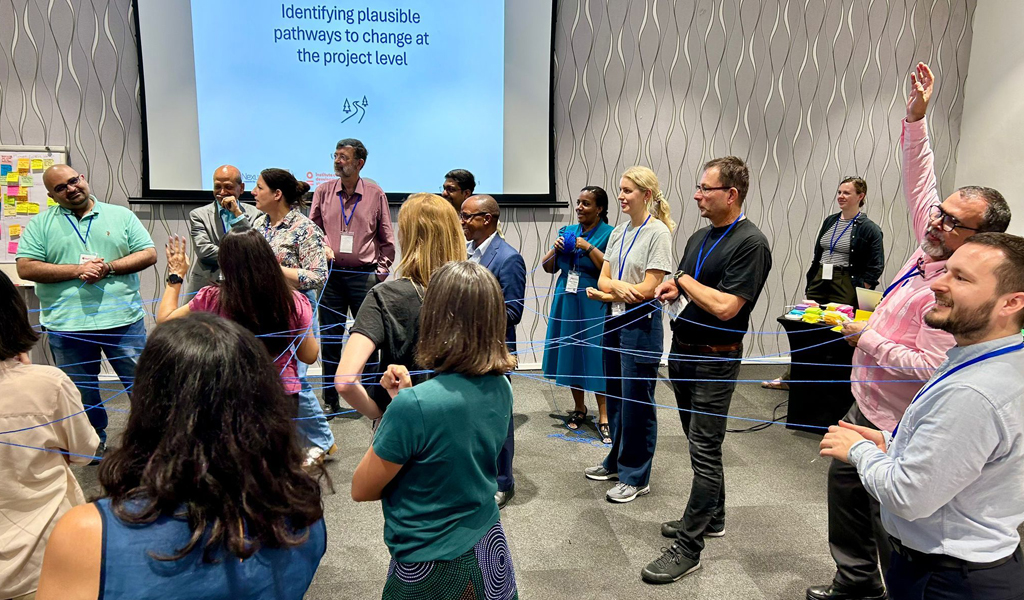Earlier this month, Cape Town became a powerhouse of collaboration, invention, and dedication to addressing one of humanity’s most serious challenges: adjusting to an increasingly warming climate. This was the second convening of The Heat Adaptation Research for Action (HeatNexus) Network, a which comprises nine Wellcome-funded research teams working collaboratively from 2024 to 2030 to develop and study innovative heat adaptation interventions that enhance health and resilience in LMICs. innovative heat adaptation interventions that enhance health and resilience in LMICs.

This convening was the first to be led by the Institute of Development Studies (IDS). It brought together an exceptional mix of project leaders, academics, researchers, community members and communications professionals flying in from 17 different countries.
Co-hosted by the University of Cape Town and the Heat Adaptation Benefits for Vulnerable groups In Africa (HABVIA) project, the convening was designed to share ideas, enable mutual learning, celebrate progress, unpack challenges, and devise strategies for scaling solutions for the world’s most vulnerable people. It was a privilege to see these vital conversations over a period of 3.5 days and the sparks of motivation they produced.
Why HeatNexus matters
Extreme heat is one of the most pressing public health challenges of our time, disproportionately affecting vulnerable populations in low- and middle-income countries. From outdoor labourers and farmers, to pregnant women, children and the elderly, rising temperatures exacerbate health inequities and threaten livelihoods. The numbers are staggering.
According to the World Health Organisation, between 2000–2019, approximately 489 000 heat-related deaths occurred each year. Additionally, The 2024 Global Report of the Lancet Countdown revealed that heat stress costs the global economy $835 billion annually in lost labour productivity, while a report by Sustainable Energy For All estimates that 1.2 billion people are at high risk of serious health, productivity, and nutrition challenges due to inadequate access to cooling.
Spanning diverse contexts and interventions — from cool roofs in India to housing adaptations in Kenya and agroforestry practices in Tanzania — the HeatNexus Networks links cutting-edge research with policy and community solutions to tackle the growing health risks of extreme heat. The convening provided a unique opportunity for these efforts to align on shared goals, enhance learning and collaboration, and to collectively discuss and implement interventions to protect people’s health from rising temperatures.
Highlights from the Convening
- Think Tank sessions for insights and collaboration: The convening brought together experts from all nine HeatNexus projects, creating a vibrant environment for exchanging ideas and addressing challenges. Whether through structured workshops, peer-engaged deep dives, formal deliberations or informal conversations, participants shared insights related to practical research and implementation challenges, explored the ethics of their work on the environment and other living beings that go beyond traditional human-focussed research, and built connections that will shape the future of their projects and the Network.
- Skills labs for real-world impact: Practical workshops such as media engagement, strategic stakeholder collaboration planning, and persona mapping equipped participants with tools to amplify their impact and reach key policymakers, implementers, communities, and influencers. These sessions emphasised actionable strategies to translate research into practice and engage effectively with diverse audiences.
- Mapping pathways to change: In sessions like identifying plausible pathways to change, teams worked collaboratively to explore how their projects will achieve tangible outcomes and contribute to wider impact. These discussions were instrumental in identifying synergies across projects and aligning local interventions with the broader goals of the HeatNexus Network.
- Amplification and engagement: Participants also explored strategies for Amplification and Global Engagement, discussing how to sustain momentum and scale successful interventions. These conversations underscored the importance of leveraging partnerships, storytelling, and innovative communication to drive systemic change. Mapping a timeline of key events and opportunities to amplify the work of individual projects as well as the Network as a whole resulted in dedicated efforts and priority determinations for the projects, for IDS and for Wellcome overall.
A collective vision for the future
While the event was marred by the very real and heart wrenching challenges faced by colleagues, friends and research participants who have been impacted by conflict in neighbouring countries, natural disasters, climate change events and changing US aid policies and funding. The loss of income, stability, livelihoods, and safety in many cases only reinforced the motivation to focus on interventions that will contribute to improved health and resilience for communities globally. The convening reinforced that the HeatNexus Network is more than just a collection of projects. It is a cohesive, collaborative force working to build resilience and equity in the face of a heating planet. By connecting diverse expertise and fostering interdisciplinary collaboration, the Network is not only addressing immediate health risks but also contributing to long-term, systemic solutions.
One of the key takeaways from the convening was the power of relationships—both within the Network and with external stakeholders. As we move forward, these connections will be critical in ensuring that the research and interventions are inclusive, impactful, and sustainable.
Thank You to Wellcome and our partners
This convening would not have been possible without two key partners: 1) the visionary support of Wellcome, whose investment in climate and health research is driving transformative action, and 2) our generous hosts at the University of Cape Town. We are equally grateful to all the project leads, researchers, and stakeholders who joined us, bringing their energy, expertise, and dedication to the table. Their collective contributions are shaping the future of heat adaptation.
Stay connected
To learn more about the HeatNexus Network and our ongoing work, follow us on LinkedIn: HeatNexus LinkedIn page. Join us in building a future where communities worldwide are better equipped to adapt to the realities of a heating planet. The Cape Town convening was just the beginning. Together, we are driving meaningful change, one step closer to a more heat-resilient and equitable world.
Let’s keep the momentum going!
